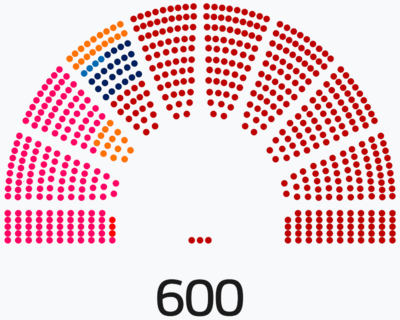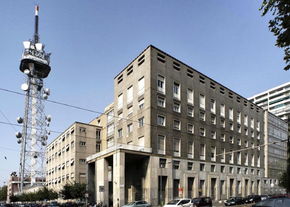2021 Etrurian federal election: Difference between revisions
No edit summary |
|||
| Line 505: | Line 505: | ||
=== Political violence === | === Political violence === | ||
The election was declared the “most violent on record” by both the [[National Police Service of Etruria|National Police Service]] and the [[Civil Security Service]]. Over 540 incidents of violence was recorded during the campaign. Around 90% of incidents were confined to clashes between far-left and far-right protest groups, such as [[Vaffunc]], [[United Combatants of the Left]] on the left, and the [[Coorte 46]] and [[Templare Nero]] on the extreme right. 55 incidents involved activists from the political parties themselves and though less severe, did involved exchanges of blows. | |||
At least fourteen people were seriously injured throughout the campaign from clashes. The NPS described the clashes as “sporadic, spontaneous and usually the result of competing protests inadvertently meeting at the same location.” It did however report that, “there were indications of pre-planned confrontations by both sides.” | |||
The [[Independent Voting Observation Group]], blamed the violence on political rhetoric, social media and the hyper-partisanship that has emerged since 2016. The IVOG blamed the [[Tribune Movement]]’s framing of the election as a “cataclysmic confrontation” between “good and evil”, “Catholic patriots against nihilistic athiests.” Toward the final stages of the election, President [[Francesco Carcaterra]] called for a “People’s Crusade” against the opposition at the ballot box, regularly calling for “the patriotic and faithful to rise up at election day and decimate those who would undo Etruria by putting that X next to the Tribune Movement.” The IVOG, the [[Social Democratic Party (Etruria)|SDP]] and the left-leaning press criticised his language, claiming he was calling for a {{wp|holy war}} against the Tribunes’ enemies. | |||
==== Schiuntrave Attack ==== | ==== Schiuntrave Attack ==== | ||
Revision as of 16:39, 15 October 2021
| |||||||||||||||||||||||||||||||||||||||||||||||||||||||||||||||||||||||||||||||
All 600 seats to the Chamber of Representatives 301 seats needed for a majority | |||||||||||||||||||||||||||||||||||||||||||||||||||||||||||||||||||||||||||||||
|---|---|---|---|---|---|---|---|---|---|---|---|---|---|---|---|---|---|---|---|---|---|---|---|---|---|---|---|---|---|---|---|---|---|---|---|---|---|---|---|---|---|---|---|---|---|---|---|---|---|---|---|---|---|---|---|---|---|---|---|---|---|---|---|---|---|---|---|---|---|---|---|---|---|---|---|---|---|---|---|
| Turnout | 73.60% ( | ||||||||||||||||||||||||||||||||||||||||||||||||||||||||||||||||||||||||||||||
| |||||||||||||||||||||||||||||||||||||||||||||||||||||||||||||||||||||||||||||||
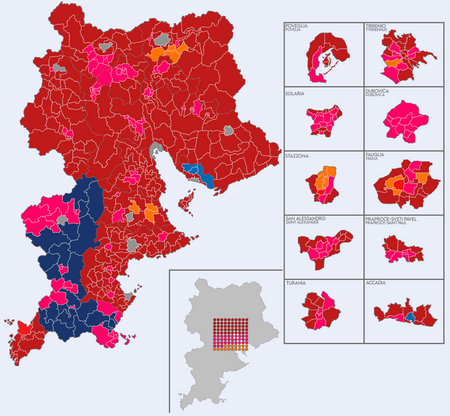 | |||||||||||||||||||||||||||||||||||||||||||||||||||||||||||||||||||||||||||||||
| |||||||||||||||||||||||||||||||||||||||||||||||||||||||||||||||||||||||||||||||
The 2021 Etruria federal election will take place on November 05, 2021, to elect all 600 members of the Chamber of Represenatives to the XXth Etrurian Senate. The legal documents dissolving the Senate for the period of 05 October to 05 November was accepted by President of the Chamber Ivano Jandroković after President Francesco Carcaterra utilised his constitutional power to call a snap election.
Background
Date
The Articles of Federation (Articoli della Federazione) state under Article 20 that elections for the Chamber of Representatives must be elected no later than 30 days after the fourth or fifth anniversary of the first sitting of the current Chamber (Camera). The dissolution of the current Camera must take place 30 days before election day, excluding public holidays, and the newly elected Camera must hold its first sitting within 14 days of election day, not including public holidays.
Article 21 of the Articles of Federation grants the Etrurian executive the right to dissolve the sitting Camera and hold an election at any point of their choosing within the 5-year maximum period. Should an early election be called it must be held on the first friday of any given month. The dissolution of the Camera maybe pre-announced according to Article 21.2 - for example, the 2021 election was declared in August and the current Camera was to be dissolved on 5 October, exactly 30 days before the dated election on 5 November. The government may dissolve the Camera without a parliamentary vote.
Electoral system
Following the passing of the 2021 Legislative and Electoral Reform Law on 23 August 2021, the electoral system was radically overhauled. The Chamber of Representatives was reduced in size from 680 to 600 and the electoral voting system was also changed. Of the 600 members, 500 are elected by first past the post to single-member constituencies, while the remaining 100 are elected by party list to a single national constituency. How the party list results are calculated was also changed in the law, ending state-level results being collated, to now the seats being awareded on the basis of the national vote from FPTP seats.
Since 2004, Etruria's elections have operated a 5% electoral threshold for parties to be awarded seats on the party-list, this is the same for coalitions of any size. FPTP seats are distributed across Etruria's fifteen states in line population with Veratia, the most populous, holding 189 seats and Il Dogado, the smallest, only 8. Seat apportionment is subject to non-binding review every four years, and officially reviewed with changes every decade following a national census.
The required majority to form a government is 301 seats. Prior to 2017, when all of Etruria's seats were elected under the party-list system, coalitions and agreements were necessary for governments to be formed. However, the 2017 Etrurian constitutional referendum introduced FPTP to 400 seats and enabled the Tribune Movement (incumbent government since 2016) to be elected in 2018, as the first single-party government since the end of the Military junta and restoration of democracy in 1984.
Parties and leaders
The 2017 constitutional amendments also included changes to the requirements for parties to compete in federal elections. In order to officially be registered, a political party must hold seats at the state and local level, both of which are set at a minimum of 10 seats. Candidates for constituency seats must also pay a ₣2,680 deposit, while those competing for party-list seats need to pay ₣1,200, which are returned if a candidate secures more than 5% of votes. It has been consistently rare for local/state level parties to compete federally, often campaigning on behalf of a national party that shares similar agendas or ideological beliefs.
The Federal Electoral Commission reported on 20 September that four parties had officially registered candidates to compete in the election and had met the requirements.
| Parties/Coalitions represented in the XXth Chamber of Representatives | ||||||||
|---|---|---|---|---|---|---|---|---|
| Party/Coalition Style |
Ideology | Leader(s) | 2018 result | Current seats | ||||
| Votes (%) | Seats | |||||||
| Patria | Tribune Movement Movimento Tribvne |
Right-wing populism | Francesco Carcaterra | 53.66% | 414 / 680
|
402 / 680
| ||
| Farmers and Workers Union UAL |
National conservatism | Davor Krstičević | 29 / 680
|
29 / 680
| ||||
| Social Party of the Third Party Partito Sociale del Terz'Ordine |
Syncretic Sotirian socialism (economic), Sotirian right (social) |
[[ ]] | Did not exist | 0 / 680
| ||||
| Citizens' Alliance AC |
Classical liberalism | Mauro Cesare Capra | 28.58% | 160 / 680
|
160 / 680
| |||
| Sotirian People's Force Forza Popolare Sotiriana |
Sotirian democracy | Vittore Eugenio Agrella | Did not exist | 51 / 680
| ||||
| Social Democratic Party SD |
Social democracy | Chiara Mastromarino | 15.76% | 38 / 680
|
38 / 680
| |||
| Extra-parliamentary parties participating in the 2021 federal election | ||||||||
|---|---|---|---|---|---|---|---|---|
| Party | Leader | Main ideology | Position | 2017 result | Regions contesting | |||
| Votes (%) | ||||||||
| Popular Renewal PR |
Giorgio Begović | Democratic socialism | Left-wing | 1.02% | 485 | |||
| Veratian National Party Partito Nazionale Veraziani |
Enrico Fattoiani | Regionalism | Centre-right | 0.60% | 23 | |||
| Green Future Futuro Verde |
Alissa Santorini/Mario Giorgini | Green socialism | Left-wing | 0.34% | 105 | |||
| Together for Carvagna Insieme |
Caterina D'Angeli | Regionalism | Centre-left | 0.04% | 39 | |||
Campaign
Debates
| Etrurian federal election debates, 2021 | ||||||||||||
|---|---|---|---|---|---|---|---|---|---|---|---|---|
| Date | Organisers | Channel | P Present A Absent invitee NI Non-invitee | Notes | ||||||||
| MT/PSTO | SD | AC | UAL | FPS | RP | |||||||
| 23 September | Orrizonte Media | Orrizonte24 | P Carcaterra |
P Mastromarino |
P Capra |
NI Krstičević |
P Agrella |
NI Favazza |
||||
| 01 October | ARE | ARE | P Carcaterra |
P Mastromarino |
P Capra |
NI Krstičević |
P Agrella |
P Favazza | ||||
Endorsements
Newspapers and magazines
National newspapers
| Newspaper | Endorsement | Notes | |
|---|---|---|---|
| Telegrafo Solariano | Tribune Movement | ||
| La Leone | Tribune Movement | ||
| Il Popolo | Social Democratic Party | ||
| Il Messaggero Aventino | Social Democratic Party | ||
| L'Osservatore Tirrenio | Tribune Movement | ||
| La Rassegna Finanziaria | Citizens' Alliance | Called for voters to back the party the most "mature and competent" economic plan. | |
| l'Araldo | Tribune Movement | ||
National political magazines
| Newspaper | Endorsement | Notes | |
|---|---|---|---|
| Albero della Liberta | Social Democratic Party | Left-wing/Centrist political magazine | |
| La Reppublica | Social Democratic Party | Left-wing political magazine | |
| Occulus | Tribune Movement | Right-wing political magazine | |
Individuals
Tribune Movement
- Sylwester Wrzesiński, President of West Miersa
- Isilda Cerqueira, Premier of Paretia
- Archbishop Giovanni D’Marco
- Archbishop Enrico Ferdiando Dettori
- Archbishop Umberto Francesco Zampieri
- Archbishop Alessandro Urbano Tagliani
- Archbishop Andrea Paolo Veronesi
- Archbishop Vittore Amadeo de Frixaturo
- Fr. Girolamo Urbano Mogherini, Prelate of the Society of Saint Diocletian
- Fr. Giovanni Batistia Ercolani, Prelate for the Poor Soldiers of the Kingdom of Heaven
- Alessandro, pop singer
- Massimo Bartolucci, actor
- Quintano Aurelio, pop singer
Social Democratic Party
Citizens' Alliance
Sotirian People's Force
Popular Renewal
Organisations and political parties
Tribune Movement
Social Democratic Party
Opinion polls
Pre-2021 election
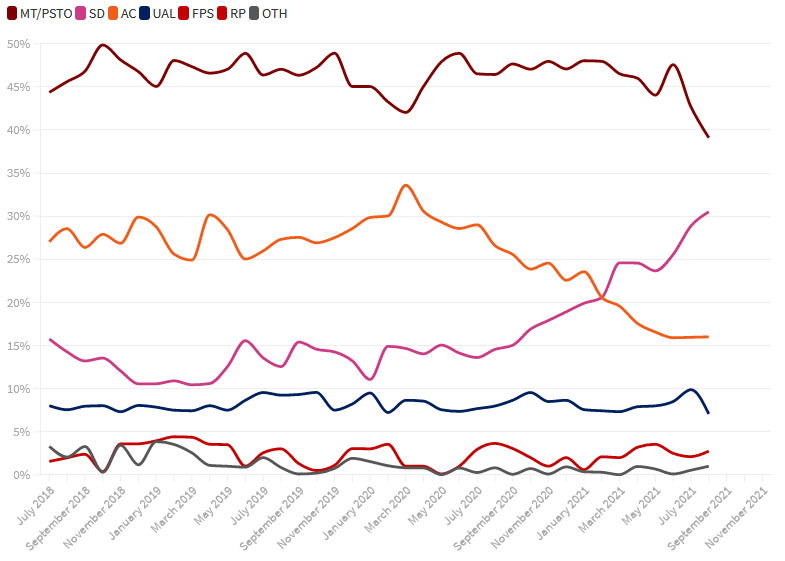
Results
Results for constituency results were released on the night of the election through to the early hours of the 9 October. The first seat to declare its result was San Casciano supra Mecurio at 23.40pm, the last seat to declare was Savudrija at 12.04pm the next day due to ten recounts taking place. By 04.27am, the Tribune Movement was officially declared the winner of the election after it exceeded 301 declared seats, with the Social Democratic Party being confirmed as the Party of Opposition shortly after at 04.29am, after the last Citizens' Alliance seat was declared. The Party List results were announced at 09.00am on the 9 October by the Federal Election Commission.
The Tribune Movement won 373 seats, down from 402 prior to the election (due to both the reduction of lawmakers from 650 to 600 and net losses to the SD), exceeding the exit poll by 5 seats. The SD won 166 seats, a net gain of 128 seats, exceeding the exit poll by 9 seats. The Citizens' Alliance won 31 seats, a net loss of 110 seats, securing less seats than the exit poll predicted. The Farmers and Workers Union won 23 seats, down by 6, the UAL defied the exit poll by three seats, the Sotirian People's Force which entered the election with 51 seats (all defections from the Tribune Movement and the defunct Democratic Alternative for Etruria), lost 47 seats to retain 4, though exceeding the exit poll by one seat. Popular Renewal entered the federal legislature for the first time, winning three seats.
| 373 | 166 | 31 | 23 | 4 | 3 |
| MT/PSTO | SD | Citizens' | UAL | FPS | RP |
| Party | Votes | % | Party list | Constituency | Total | ||||||
|---|---|---|---|---|---|---|---|---|---|---|---|
| Seats | Seats | Seats | ± | ||||||||
| MT/PSTO | 16,101,865 | 44.20% (-4.62%) | 49 | 324 | 373 | -29 | |||||
| Social Democratic Party | 11,300,449 | 31.02% (+17.84%) | 34 | 132 | 166 | +128 | |||||
| Citizens' Alliance | 5,500,863 | 15.10% (-10.24%) | 17 | 14 | 31 | -110 | |||||
| Farmers and Workers Union | 1,129,316 | 3.10% (-5.85%) | 0 | 23 | 23 | -6 | |||||
| Sotirian People's Force | 1,165,745 | 3.20% (new) | 0 | 4 | 4 | -51 | |||||
| Popular Renewal | 1,129,309 | 3.10% (+2.08) | 0 | 3 | 3 | +3 | |||||
| Green Future | 49,582 | 0.13% (-0.13) | 0 | 0 | 0 | N/C | |||||
| Veratian National Party | 36,112 | 0.09% (-0.51) | 0 | 0 | 0 | N/C | |||||
| Together for Carvagna | 16,308 | 0.04% (N/C) | 0 | 0 | 0 | N/C | |||||
Analysis
While the election returned the Tribune Movement to government with a landslide majority of 146 seats, it also saw a 4.62% drop in its share of the popular vote from 2018. Tribune majorities in constituency seats were slashed by an average minimum of 5%, while in sixteen seats in Dinara, Peravia and north-central Veratia, the majorities to slashed by over 10 points to just mere hundreds of votes. While across many seats the SD surged to second place, the majority of votes lost by the Tribunes went over to the Sotirian People's Force, while a sizeable minority went to the SD. According to official research, these lost voters were near exclusively drawn from the upper-middle class, whom the Tribunes gained in 2018 and a smaller percentage came from the lower-middle class who form what many consider to the be the Tribune base. While the party lost 29 seats, the Tribune's share of the vote stands as their second best result after 2018, higher than 2016 when they first entered government. The Tribunes scored their best results in Carinthia winning every seat bar three outside of Praproče.
President Francesco Carcaterra as leader of the Tribune Movement, became the first Etrurian leader to win three consecutive electoral victories. He also secured the opportunity to become the longest-serving democratic leader in Etrurian history if he serves a full five-year term by 2026.
The SD had their best result since 2013 at 31% seeing gains in every state except Aeolia and Tarpeia; it is also the first time since 2009 that emerged as the official party of opposition (having entered into a grand coalition in 2013 through to 2016). The SD secured some of the highest recorded swings in constituency seats since they were introduced in 2002, with the highest being 28.95% in Marsaglia-Cansoira, which they gained from the Tribune Movement. The SD saw its best results in Dinara, Chiastre and Novalia and Solaria. In Chiastre they seized five of the seven constituency seats, up from three; in Novalia they gained 29 seats, including every seat in Dubovica and Barijerni Otoci. In Veratia, the SD captured Caxeri's four seats and Piavenna's five seats. The SD captured or held 11 of Solaria's 21 seats, making four gains from the Tribune Movement.
The Citizens' Alliance had their worst result since its inception in 2011, losing 110 seats and retaining only 31, predominately through the party list. The party only held 14 constituency seats and saw a 10 point drop in its vote share from 2018. The Citizens' witnessed a collapse of their vote share across the country, though this was most pronounced in the states of Palestrina, Tarpeia, Aeolia, Accadia and Chiastre. In Accadia for example, the Citizens saw as much as a 20 point decrease, to benefit both the SD and the Sotirian People's Force. In several seats, the increase in the SD vote share was off-set by the failure of the SPF's ability to break through, enabling the Tribune Movement to capture seats through a split vote. The Citizens' remaining seats were isolated in near totality to urban seats in Etruria's largest cities and the affluent suburban seats of Faulia.
The losses suffered by the Citizens' were such, that several prominent frontbenchers lost their seats including; Giacomo Bruno Verdi, the spokesman for finance, Mariella Fontana, spokeswoman for Health and Social Services, Marco Alberici, spokesman for Industry and Labour Affairs and Donnatella Maria Campitelli, the Party Treasurer.
The Farmers and Workers Union suffered its worst result since 2009, losing six seats but over 5 points in its share of the popular vote. The party saw the total loss of its seats in Dubovica and half the seats of Coastal Novalia, notably its majority in Supetar was slashed by 22,000 votes, the seat widely considered to be its birthplace and stronghold. The party saw its majorities slashed on average by 10,000 votes across all seats it held, while seats it sought to gain from the SD, saw vote shares declined by almost 10%. A vast majority of of voters left the party for the SD, while a smaller percentage defected to the SPF.
The Sotirian People's Force having entered the election with 51 seats, all drawn from defectors lost 47 seats and retained only four. Its leader, Vittore Eugenio Agrella was elected to Accadia Centro with a majority of 18,530. As the party of Sotirian Democracy, it scored the worst result for the traditional Etrurian political strain since its emergence in the 1940s and 1950s under the Etrurian Third Republic. The party's four seats were restricted entirely to Accadia the state, and Accadia the city.
Popular Renewal secured its best result since its foundation in 2010, winning over a million votes and three constituency seats. It won the Tarpeian seat of Villa Vicentina-Saciletto, the Faulian seat of L'Aquila and the seat of Borgaccio in Stazzona. The party leader, Aurelia Favazza won the seat of Borgaccio with a majority of 8,699 and her surprise win is credited to the SD candidate falling foul of voters after he was caught paying youngsters to spray anti-Citizens' Alliance graffiti on walls. The party's vote came from predominately ethnic-Miruvians and disenchanted SD voters who felt the party had moved to far to the centre. Popular Renewal's entry into the federal legislature marked the first time a far-left political party had federal representation since the United Social Worker's Party of the Etrurian Third Republic (1948-1960).
Responses
Domestic
Domestically, the result of the election “laid bare the gulf dividing the two Etrurias that now exist: pro-Tribune and anti-Tribune” according to the left-leaning Il Popolo newspaper. In Tribune-governed cities across Etruria, large television screens were erected in squares and parks to provide citizens with live coverage of the election from 9.50pm onward. According to Etrurian media, thousands of people gathered in these places and greeted the exit poll predicting a third Tribune landslide with loud cheers, fireworks and music. Small but peaceful anti-government protests erupted in northern cities like San Alessandro, Faulia and Carcaforo. Albero della Liberta, a popular political magazine described the result as the "death knell for Etrurian constitutionalism should the SD fail to live up to expectations."
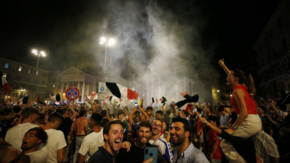
While the election saw a near seven point drop in turnout, it was recorded as the second largest election by votes cast after 2018. The Tribune Movement’s results exceeded expectations both internally and externally, with some analysts describing the late-Tribune surge as a “blip.” While the Tribune vote fell by 4.62%, its share of the vote among young voters increased a second time, though by a smaller margin compared to 2018. The Tribune victory was credited to the party’s “message discipline, unmatched political machine and grassroots network” by the pro-Tribune Telegrafo Solariano. The pro-opposition press blamed the Tribune victory on its gerrymandering, malapportionment, and misuse of government resources.
The Social Democratic Party accused the Tribune Movement of direct involvement in the theft and leaking of archived film footage from a 2017 ARE documentary on the EC referendum. The SD stated that it would table a legislative bill calling for a parliamentary inquiry on the first day of the new Senate, which denounced by the Tribune Movement as an attempt to “sabotage the election result, just as they sabotaged the August Referendum. The SD reaffirmed in an online statement that Chiara Mastromarino would continue as party leader and would "prove to be the valiant defender of freedom as leader of the people's opposition."
Mauro Cesare Capra, leader of the Citizens' Alliance dodged questions from reporters on whether he would step down as leader following the party's loss of over 100 seats. Numerous figures on the party's left-wing demanded he step down for having led the party into a catestrophic result. However, supporters of Capra blamed the timing of the election in relation to Capra's election as party leader in July, claiming he had little time to present himself to the people.
The Farmers and Workers Union which had lost six seats and over a million votes from 2018, saw its federal leader, Davor Krstičević step down on Tuesday 12 October following a meeting of the party's national coordination council. He was succeeded Zoltan Katičić on an interim basis until a new federal leader could be elected. However, the party accused the SD of "systemic and systematic fraud across Novalia", citing four constituency seats that fell to the SD, where majorities were below 100. The party claimed that in all four seats, where local authorities are SD-led, electoral officers refused to conduct more than two re-counts, the party officially took its case to the Public Affairs Court on 15 October, demanding the court disavow the results and order re-runs. The SD stated it would resist a "legal attempt to undermine and reject a legitimate election result."
International
Controversies
The election was described by both candidates and commentators as the "most dirty and underhanded" since the restoration of democracy in 1984. The election also marred by daily incidents of political violence, predominately between anti-functionalist and far-right protest groups; which culminated in the Schiuntrave shootings which killed three and left seven injured. The election was also the first to be classified as "free but unfair" by various think-tanks and non-governmental organisations.
ARE Documentary controversy
One of the most profound controversies of the election was the apparent theft and leaking of footage from a 2017 ARE documentary covering the 2016 EC membership referendum. 17 minutes of footage, deleted in post-production but retained on the original film, was leaked to every major newspaper and broadcaster on 28 September. The scenes were untouched and retained various marks of original filming but partially edited in post-production, but was comprised of interviews with prominent figures from the Social Democratic Party making negative comments about voters who rejected EC membership in 2016. As many of the featured individuals held senior posts within the party as of day of leaking, most newspapers published stories covering the comments in the "public interest." The story served to stunt SD momentum and ultimately the return of many Tribune voters who had defected to the centre-left party during the first half of the election. The SD's high of 36% fell precipitously over the course of several days, with the party being polled at 27% on October 7, though it would secure 31% of the vote on election day.
While most of the nation's attention fell on the controversial remarks made by the political figures in the footage, questions and criticisms emerged as to how the footage was leaked in the first place. On the 29 September, Ronaldo Frederico Furfaro, who served as the Director for Educational and Documentary Productions at ARE from 2010 to 2018, told Orrizonte24 a rival broadcaster to ARE, that "all productions are held digitally and physically at the Archive in Tyrrenhus, meaning in the former case either ARE was hacked or an employee accessed the database, and in the latter case, someone physically stole the film or again, an employee withdrew the film and leaked it to the press." Over the course of several days, former and current ARE employees commented to the press that Furfaro was correct on ARE procedures. On October 3, Orrizonte24 interviewed Sadip Patel, a security guard at the Archive Building, who claimed that a colleague had reported strange sounds in the archive room and reported a broken door lock and an open side entrance to his superiors.
On October 1, ARE announced it would launch an internal investigation into how the footage was leaked, though this was criticsed by the SD as inappropriate due to its "status as being compromised by the Tribune Movement appointed executives who have turned the broadcaster into a government mouthpiece." The SD instead called for a police investigation into the matter, while the Citizens' Alliance, which benefited by the leak as much as the Tribune Movement called for an independent review of ARE's practices. On Octber 4, the SD accused the Tribune Movement of leaking the footage, describing the move as an "illegal and depraved attempt to derail the surging opposition from ending their five year nightmarish reign." The Tribune Movement denied any connection, describing the SD's accusation as a "hysterical response to the mask slipping and revealing the dark patrician elitism at the heart of the SD."
On October 14, ARE reported that it had found no evidence of a physical break-in at the Archive Building and confirmed the film was accounted for within the room itself. A review by its internal IT security team also dismissed claims it had been electronically hacked. On October 15, Giuliano Scorzzi, a former legal adviser to ARE, who resigned in 2019 over the broadcaster's subordination to the government, claimed that in 2019, shortly after the Tribune government sacked and replaced the entire executive board of ARE, an internal audit and listing of archived productions from 2009 to 2018 was to be conducted. Scorzzi further claimed in his interview with Il Popolo, that "such an audit would list every production by title and subject, giving whoever read it an A-Z on political and news productions."
On the 18 October, the SD announced its intention to propose legislation demanding an inquiry into the leak, as well as using its chairship of the Senate Committee for Media, Culture and Sport to issue subpoenas for internal ARE communications and memos relating to the alleged audit of productions.
Political violence
The election was declared the “most violent on record” by both the National Police Service and the Civil Security Service. Over 540 incidents of violence was recorded during the campaign. Around 90% of incidents were confined to clashes between far-left and far-right protest groups, such as Vaffunc, United Combatants of the Left on the left, and the Coorte 46 and Templare Nero on the extreme right. 55 incidents involved activists from the political parties themselves and though less severe, did involved exchanges of blows.
At least fourteen people were seriously injured throughout the campaign from clashes. The NPS described the clashes as “sporadic, spontaneous and usually the result of competing protests inadvertently meeting at the same location.” It did however report that, “there were indications of pre-planned confrontations by both sides.”
The Independent Voting Observation Group, blamed the violence on political rhetoric, social media and the hyper-partisanship that has emerged since 2016. The IVOG blamed the Tribune Movement’s framing of the election as a “cataclysmic confrontation” between “good and evil”, “Catholic patriots against nihilistic athiests.” Toward the final stages of the election, President Francesco Carcaterra called for a “People’s Crusade” against the opposition at the ballot box, regularly calling for “the patriotic and faithful to rise up at election day and decimate those who would undo Etruria by putting that X next to the Tribune Movement.” The IVOG, the SDP and the left-leaning press criticised his language, claiming he was calling for a holy war against the Tribunes’ enemies.
Schiuntrave Attack
Misinformation and social media
Throughout the election, NGOs dedicated to observing misinformation on social media, reported numerous instances of such by politicians from the Patria, though also to a lesser degree, opposition parties. Among the most prominent cases were claims that upon an SD election, over 800,000 Tsabarans would be invited to settle in Etruria, the Social Democratic Party was bankrolled and organised by Kirenia, the Citizens' Alliance, due to its neoliberal economic policies was in subordinated to Shangea and that foreign actors were actively seeking to influence the election.
The Etrurian Digital Watch, an independent NGO dedicated to identifying and reporting conspiracy theories online - reported three major strains, supported, propagated and spread by Patria candidates. The first was regular accusations that candidates for the SD and Citizens' were undergoing demonic possession, unmarried male candidates were closet homosexuals and that the SD and Citizens sought to "abolish the Solarian Catholic Church" through taxation and property seizures.
Electoral conduct
The election was marred by “widespread misconduct by all parties, but more so the Tribune Movement which violated at least 58 electoral rules, regulations and laws” according to the Independent Vote Observation Group, an NGO established in wake of the 2018 election to study and report of unethical conduct in local, state and federal elections.
The Tribune Movement was accused of using government resources, including advertising, infrastructure and even government funds to support its election campaign. The Tribunes were reported to have used the National Publishing Group, a state-owned publishers specialising in printing election ballots, information leaflets and formal government documents to mass produce campaign leaflets and circulars.
Poste Etruriane, the state-owned national postal service was accused of prioritising the delivery of Tribune publications over the opposition parties at the behest of the Ministry of Economic Development. Reports also circulated that the postal service failed to deliver any material produced by the opposition during the final two weeks of the election. This claim was reported across hundreds of constituency seats, while a post-election poll conducted by Demos Analytica on behalf of the SD and the IVOG, revealed that 68% of households in twenty seats where this was reported, recorded that they had not received any opposition material in the final two weeks, while 20% of households reported no opposition material at all during the entire campaign. Both the Tribune Movement and Poste Etruriane rejected the accusations, counter-claiming that the opposition and its "NGO allies" were distorting reality, citing the delivery of materials by party activists and volunteers.
The Schiaparelli Institute for Democracy, a left-leaning think tank classified the 2021 election as "free but fundamentally unfair." The group paid great focus to the inbalance in coverage by ARE, the public broadcaster, which provided the Tribune Movement and the Farmers and Workers Union with 90% of its coverage. Conversely, the broadcaster afforded the SD, 3.2%, the Citizens 1.50% and the remaining parties 1.10%. The Institute described what little coverage the opposition received as "grotesquely biased and critical", with opposition coverage being near universally focused on the mishaps and gaffes of candidates. The group also criticised the second televised debate hosted by ARE, claiming the broadcaster had stacked the studio audience with Tribune supporters and only asked loaded questions that would align with the Tribune Movement platform.
On the 12 October, the Social Democratic Party announced its intention to formally table a legislative bill calling for an independent inquiry into the Tribune Movement's electoral conduct, as well as the ARE footage leak.




